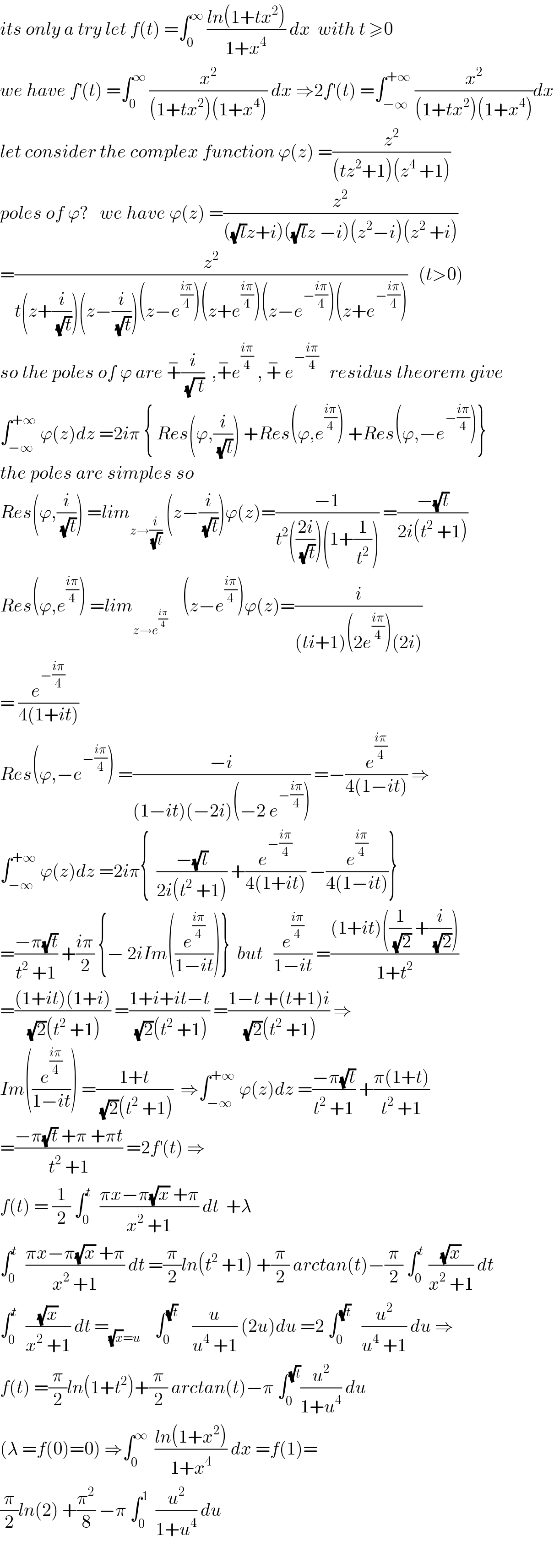
Question and Answers Forum
Question Number 61208 by Tawa1 last updated on 30/May/19

Commented by maxmathsup by imad last updated on 30/May/19

Commented by maxmathsup by imad last updated on 30/May/19
![let decompose F(u) =(u^2 /(u^4 +1)) ⇒F(u) =(u^2 /((u^2 +1)^2 −2u^2 )) =(u^2 /((u^2 +(√2)u +1)(u^2 −(√2)u +1))) =((au +b)/(u^2 +(√2)u +1)) +((cu +d)/(u^2 −(√2)u +1)) F(−u) =F(u) ⇒((−au +b)/(u^2 −(√2)u +1)) +((−cu +d)/(u^2 +(√2)u +1)) =F(u) ⇒c=−a and b=d ⇒F(u) =((au +b)/(u^2 +(√2)u +1)) +((−au +b)/(u^2 −(√2)u +1)) F(0) =0 =2b ⇒b=0 F(1) =(1/2) = (a/(2+(√2))) −(a/(2−(√2))) =(((2−(√2)−2−(√2))a)/2) ⇒1=−2(√2)a ⇒ a =−(1/(2(√2))) ⇒F(u) =−(1/(2(√2))) (u/(u^2 +(√2)u +1)) +(1/(2(√2))) (u/(u^2 −(√2)u +1)) ⇒ ∫_0 ^1 F(u)du =−(1/(4(√2))) ∫_0 ^1 ((2u+(√2)−(√2))/(u^2 +(√2)u +1)) du +(1/(4(√2))) ∫_0 ^1 ((2u−(√2) +(√2))/(u^2 −(√2) u +1))du =−(1/(4(√2)))[ln(u^2 +(√2)u +1)]_0 ^1 +(1/4) ∫_0 ^1 (du/(u^2 +(√2)u +1)) +(1/(4(√2)))[ln(u^2 −(√2)u +1)]_0 ^1 +(1/4) ∫_0 ^1 (du/(u^2 −(√2)u +1)) ∫_0 ^1 (du/(u^2 +(√2)u +1)) =∫_0 ^1 (du/(u^2 +2(1/(√2))u +(1/2) +(1/2))) =∫_0 ^1 (du/((u+(1/(√2)))^2 +(1/2))) =_(u+(1/(√2))=(t/(√2))) ∫_1 ^((√2) +1) (dt/((√2)((1/2))(1+t^2 ))) =(√2) [arctan(t)]_1 ^((√2) +1) =(√2){ arctan(1+(√2))−(π/4)} ∫_0 ^1 (du/(u^2 −(√2)u +1)) =∫_0 ^1 (du/((u−(1/(√2)))^2 +(1/2))) =_(u−(1/(√2))=(t/(√2))) ∫_(−1) ^((√2)−1) (dt/((√2)((1/2))(1+t^2 ))) =(√2) [arctan(t)]_(−1) ^((√2)−1) =(√2){ arctan((√2)−1)+(π/4)} ⇒ ∫_0 ^1 F(u)du =−(1/(4(√2)))ln(2+(√2)) +(1/(4(√2)))ln(2−(√2))+((√2)/4){arctan(1+(√2))−(π/4)} +((√2)/4){arctan((√2)−1)−(π/4)} ⇒ ∫_0 ^∞ ((ln(1+x^2 ))/(1+x^4 )) dx =(π/2)ln(2)+(π^2 /8) +(π/(4(√2))){ln(((2−(√2))/(2+(√2))))} −π((√2)/4){ arctan((√2) +1) +arctan((√2) −1)−(π/2)} .](Q61216.png)
Commented by ajfour last updated on 30/May/19

Commented by Tawa1 last updated on 30/May/19

Commented by Tawa1 last updated on 30/May/19

Commented by maxmathsup by imad last updated on 30/May/19

Commented by perlman last updated on 30/May/19

Commented by maxmathsup by imad last updated on 31/May/19

